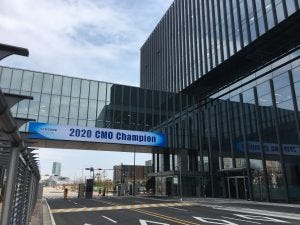
Samsung Bio plans ‘P4 Super Plant’ on back of COVID, bulging orders and capacity constraintsSamsung Bio plans ‘P4 Super Plant’ on back of COVID, bulging orders and capacity constraints
A fourth plant at its site in Incheon, South Korea will bring Samsung Biologics a total of 620,000 liters of biomanufacturing capacity

A fourth plant at its site in Incheon, South Korea will bring Samsung Biologics a total of 620,000 liters of biomanufacturing capacity – approximately 30% of the total global biologics CMO capacity
The contract development and manufacturing organization (CDMO) announced plans for what it calls the “P4 Super Plant” this week, explaining it plans to break ground at the site in Songdo within a year.
Samsung Biologics said the decision was prompted by increasing demand for “COVID-19 treatments as well as potential new biotherapeutics requiring high dosages such as Parkinson’s and Alzheimer’s disease.”

Samsung Biologics’ site in Incheon, South Korea
Samsung Biologics added “it has signed over 1.8 trillion Korean won in orders, about 2.5 times last year’s total revenue, in the first half of 2020 alone.”
The news comes a few months after Vir Biotechnology hired Samsung Biologics to help scale manufacturing of its candidate monoclonal antibody-based COVID-19 treatments VIR-7831 and VIR-7832.
Samsung’s aim – along with fellow Vir partners GSK and Biogen – is to be in a position to begin making commercial supplies of the antibodies at plant 3 facility next year.
Capacity
Samsung mooted the new facility last month.
It cited increasing utilisation levels as a factor, predicting “operational capacity at the third plant is expected to reach full utilization by the year 2022.”
The facility will house 256,000 liters of mammalian production capacity composed of small to large scale bioreactors (2,000 L, 10,000 L, and 15,000 L) as well as fill/finish capacity.
Samsung said the project will give its site a total production capacity of 620,000 liters, which it claimed is “about 30% of the total global biologics CMO capacity.”
The project is expected to create around 1,850 jobs.
The company also said it is in negotiations with the authorities at IFEZ (Incheon Free Economic Zone) to purchase additional land for its second bio complex.
It added that “the total size of the two investments is expected to be over 2 trillion Korean won—roughly equivalent to 2 billion US dollars.”
About the Author
You May Also Like
schedl_b_and_w.jpg?width=100&auto=webp&quality=80&disable=upscale)
schedl_b_and_w.jpg?width=400&auto=webp&quality=80&disable=upscale)



